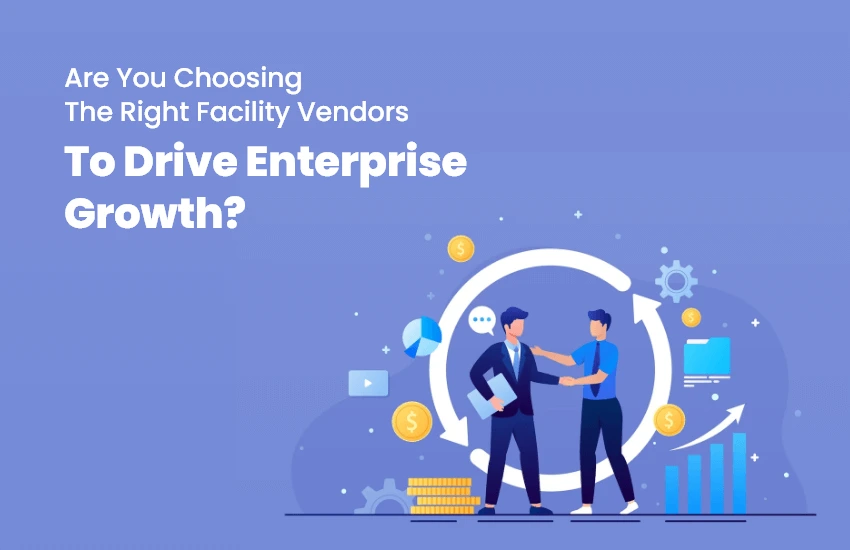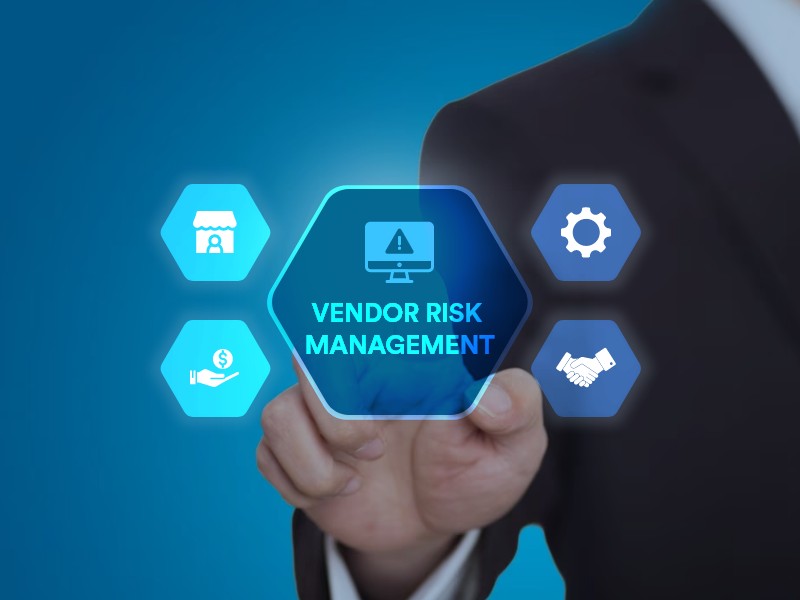Are You Choosing the Right Facility Vendors to Drive Enterprise Growth?

Do you often ponder which vendor should become your long-term business partner? Or do you often think that it would have been better if you had access to a framework or tool that would make your vendor selection process more manageable?
There are multiple ways in which businesses can save expenditure on the maintenance of their facilities. This is a primary reason behind the escalating popularity of outsourcing. This practice has become popular due to the increasing number of service vendors. Facilities account for approximately 10-25% of indirect spending for businesses with distributed operations such as retailers, manufacturers, transportation, and logistics. The global market for managing facilities in-house or through outsourcing is expected to reach $1.9 trillion by 2024. More than half of this is in the contracted segment, which has attracted many vendors offering new services.
However, finding the right facility vendor is critical for any business. Whether you require a facility maintenance service provider or any other facility-related service, it is essential to prioritize scalability and flexibility while evaluating potential vendors. In this blog, we will explain the significance of scalability and flexibility when selecting a facility vendor and provide a step-by-step guide to help you evaluate them effectively.
What is the Importance of Scalability and Flexibility for Vendors?
Scalability and flexibility are crucial for successful supplier partnerships in the service industry. It is imperative to assess a business partner’s ability to adapt and scale to meet the ever-changing demands of your organization. By doing so, you are not only ensuring the current functionality of your business but also establishing a solid foundation for the future success of your vendor management practices. We have listed a few points below that will help you understand the importance of these two attributes for facility vendors:
-
Meeting Evolving Needs:
In today’s constantly changing business landscape, companies are always evolving. At any given moment, the requirement for facility services may increase due to sudden growth, seasonal fluctuations, or unexpected crises. Scalability is the ability of a vendor to adapt their resources and capabilities to meet these changing demands without sacrificing the quality of their service.
-
Avoiding Overcommitment:
On the other hand, opting for services that go beyond your actual needs could waste resources and budget. Scalability enables service providers to customize their offerings to meet your specific requirements, ensuring that you don’t end up paying for services you do not require or left out with inadequate services when demand suddenly rises.
-
Risk Mitigation:
Unexpected events, such as natural disasters or global health crises, can disrupt operations significantly. Vendors with flexible service models are better equipped to help you navigate such situations, ensuring business continuity despite adversity. Suppliers following vendor risk management best practices can also help you get better returns on your investment.
-
Enhancing Operational Efficiency:
Flexible vendors are highly beneficial as they can easily modify their services to cater to your needs. This results in not only better service but also boosts operational efficiency. Vendors that can quickly adapt to your requirements enable your organization to concentrate on its core competencies while outsourcing specialized functions.
-
Responding to Market Changes:
Staying ahead of the curve is crucial in today’s rapidly changing markets. Flexible vendors can rapidly adapt to market changes, emerging technologies, and industry trends, ensuring your business facility remains cutting-edge and compliant with the latest regulations.
How to Evaluate Facility Vendors for Accommodating Enterprise Growth?
Selecting the right facility vendor is a strategic decision that can significantly impact your enterprise’s ability to adapt, scale, and thrive in a dynamic business environment. When considering vendors to accommodate enterprise growth, going beyond cost and service quality is essential. Here are vital steps to evaluate facility vendors effectively:
1. Define Your Growth Strategy:
Before you evaluate vendors, clearly understand your enterprise’s growth objectives. Outline short-term and long-term expansion plans, including potential changes in facilities, locations, and service needs.
2. Assess Vendor Experience:
Look for vendors with a proven track record of helping businesses grow. Ask for case studies or references from clients who have experienced growth while working with the vendor. Experience matters when understanding the challenges and solutions associated with expansion.
3. Scalability:
Evaluate a vendor’s ability to scale their services. Can they quickly adjust resources, workforce, and equipment to meet increased demand? Assess whether their client portfolio includes businesses of varying sizes to gauge their scalability.
4. Flexibility:
Determine how flexible the vendor is in tailoring their services to your specific requirements. Can they accommodate service level changes, location, or priorities as your enterprise grows? Flexibility is crucial in adapting to unforeseen circumstances.
5. Technology and Tools:
Inquire about the technology and tools the vendor employs. Advanced digital tools can enhance efficiency and provide valuable insights for growth planning. Ensure that the vendor can integrate with your existing systems if necessary.
6. Financial Stability:
A financially stable vendor is better equipped to handle the challenges of scaling up their services. Request financial statements and assess their ability to invest in necessary resources and technology for your growth needs.
7. Service Level Agreements (SLAs):
Review SLAs carefully. Ensure they include provisions for scalability and flexibility. Understand how the vendor calculates pricing for additional services or changes in scope, and whether it aligns with your budget.
8. Communication and Responsiveness:
Effective communication is vital in accommodating growth. Assess the vendor’s communication channels, response times, and accessibility. Ensure they can address concerns and adapt to changes promptly.
9. Contract Terms:
Thoroughly review contract terms, including termination clauses. Ensure room for renegotiation or adjustments if your enterprise experiences significant growth or downsizing.
10. References and Client Feedback:
Request references from the vendor and reach out to their current clients. Inquire about their experiences in terms of scalability and flexibility. Honest feedback from other businesses can provide valuable insights.
11. Risk Management:
Evaluate the vendor’s approach to risk management. Ask about their contingency plans for handling unexpected challenges that may arise during periods of growth.
12. Legal and Compliance:
Verify that the vendor complies with all relevant laws and regulations in your industry and location. Non-compliance can pose significant risks as you expand.
13. Continuous Improvement:
Inquire about the vendor’s commitment to continuous improvement. A vendor actively seeking feedback and investing in enhancing their services is more likely to support your enterprise’s growth effectively.
14. Cultural Alignment:
Assess whether the vendor’s values and culture align with your enterprise’s. A shared vision and values can foster a more productive and collaborative partnership.
15. Finalize the Selection:
After a thorough evaluation, choose a vendor who meets your immediate needs and demonstrates a genuine commitment to helping your enterprise grow.
Our Concluding Thoughts
According to FieldCircle’s CEO Yogesh Chowdhary “Your vendor partners’ reliability and performance are paramount to your enterprise’s growth and success.
As businesses grow, so do their facility needs. Companies often rely on vendors to accommodate their growth by expanding office space, adding manufacturing capabilities, or increasing warehouse capacity. But choosing the right vendor can be daunting, as the enterprise’s success depends on the efficiency and reliability of these outsourced services.
The evaluation phase must consider factors such as the selected supplier’s experience, reputation, efficiency, capabilities, and revenue. A thorough assessment is crucial to ensure that the selected vendor can meet the evolving needs of the business and provide a seamless experience.
Companies should prioritize experience, reputation, capabilities, and cost when selecting facility vendors. Experienced vendors with a strong track record can handle different challenges effectively. Importance can be assessed through online reviews, testimonials, and references. Capabilities should be evaluated to ensure the vendor can support business growth plans. Finally, businesses should balance cost-effectiveness with quality service. Companies can make informed decisions that will successfully accommodate their enterprise growth by thoroughly evaluating facility vendors based on experience, reputation, capabilities, and cost.
To know how FieldCircle can help you improve your facility processes or if you want to discuss the best facility management software that can be customized to your business’s needs and help you achieve your strategic goals, feel free to connect with our experts and schedule a demo today!


